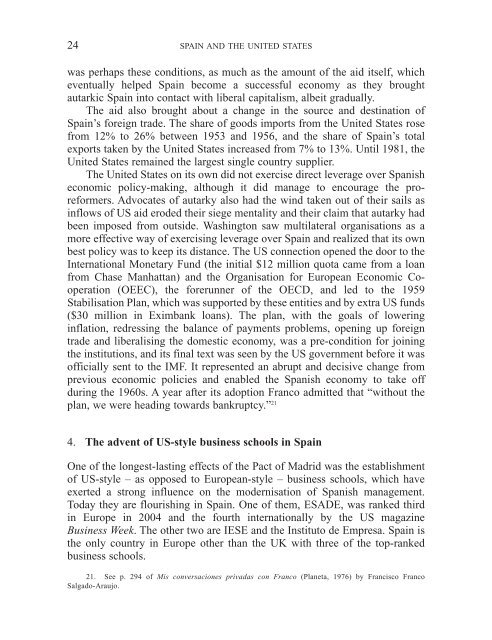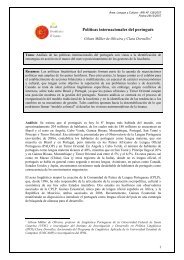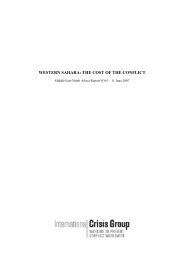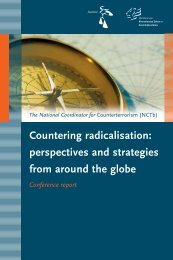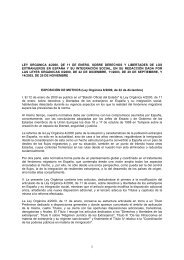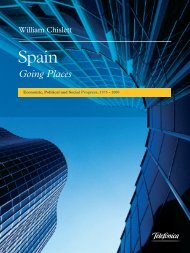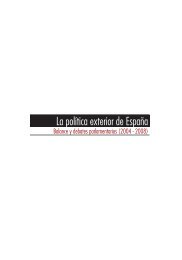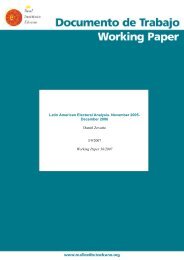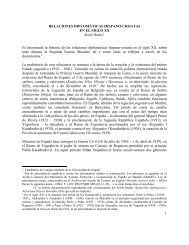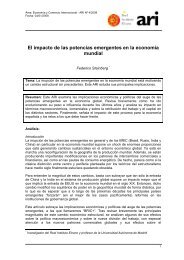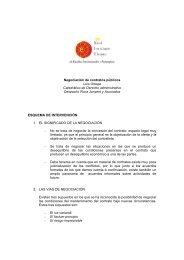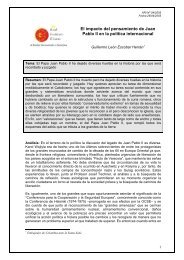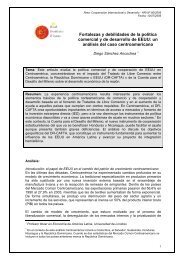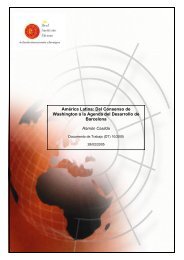Spain and the United States - Real Instituto Elcano
Spain and the United States - Real Instituto Elcano
Spain and the United States - Real Instituto Elcano
Create successful ePaper yourself
Turn your PDF publications into a flip-book with our unique Google optimized e-Paper software.
24<br />
SPAIN AND THE UNITED STATES<br />
was perhaps <strong>the</strong>se conditions, as much as <strong>the</strong> amount of <strong>the</strong> aid itself, which<br />
eventually helped <strong>Spain</strong> become a successful economy as <strong>the</strong>y brought<br />
autarkic <strong>Spain</strong> into contact with liberal capitalism, albeit gradually.<br />
The aid also brought about a change in <strong>the</strong> source <strong>and</strong> destination of<br />
<strong>Spain</strong>’s foreign trade. The share of goods imports from <strong>the</strong> <strong>United</strong> <strong>States</strong> rose<br />
from 12% to 26% between 1953 <strong>and</strong> 1956, <strong>and</strong> <strong>the</strong> share of <strong>Spain</strong>’s total<br />
exports taken by <strong>the</strong> <strong>United</strong> <strong>States</strong> increased from 7% to 13%. Until 1981, <strong>the</strong><br />
<strong>United</strong> <strong>States</strong> remained <strong>the</strong> largest single country supplier.<br />
The <strong>United</strong> <strong>States</strong> on its own did not exercise direct leverage over Spanish<br />
economic policy-making, although it did manage to encourage <strong>the</strong> proreformers.<br />
Advocates of autarky also had <strong>the</strong> wind taken out of <strong>the</strong>ir sails as<br />
inflows of US aid eroded <strong>the</strong>ir siege mentality <strong>and</strong> <strong>the</strong>ir claim that autarky had<br />
been imposed from outside. Washington saw multilateral organisations as a<br />
more effective way of exercising leverage over <strong>Spain</strong> <strong>and</strong> realized that its own<br />
best policy was to keep its distance. The US connection opened <strong>the</strong> door to <strong>the</strong><br />
International Monetary Fund (<strong>the</strong> initial $12 million quota came from a loan<br />
from Chase Manhattan) <strong>and</strong> <strong>the</strong> Organisation for European Economic Cooperation<br />
(OEEC), <strong>the</strong> forerunner of <strong>the</strong> OECD, <strong>and</strong> led to <strong>the</strong> 1959<br />
Stabilisation Plan, which was supported by <strong>the</strong>se entities <strong>and</strong> by extra US funds<br />
($30 million in Eximbank loans). The plan, with <strong>the</strong> goals of lowering<br />
inflation, redressing <strong>the</strong> balance of payments problems, opening up foreign<br />
trade <strong>and</strong> liberalising <strong>the</strong> domestic economy, was a pre-condition for joining<br />
<strong>the</strong> institutions, <strong>and</strong> its final text was seen by <strong>the</strong> US government before it was<br />
officially sent to <strong>the</strong> IMF. It represented an abrupt <strong>and</strong> decisive change from<br />
previous economic policies <strong>and</strong> enabled <strong>the</strong> Spanish economy to take off<br />
during <strong>the</strong> 1960s. A year after its adoption Franco admitted that “without <strong>the</strong><br />
plan, we were heading towards bankruptcy.” 21<br />
4. The advent of US-style business schools in <strong>Spain</strong><br />
One of <strong>the</strong> longest-lasting effects of <strong>the</strong> Pact of Madrid was <strong>the</strong> establishment<br />
of US-style – as opposed to European-style – business schools, which have<br />
exerted a strong influence on <strong>the</strong> modernisation of Spanish management.<br />
Today <strong>the</strong>y are flourishing in <strong>Spain</strong>. One of <strong>the</strong>m, ESADE, was ranked third<br />
in Europe in 2004 <strong>and</strong> <strong>the</strong> fourth internationally by <strong>the</strong> US magazine<br />
Business Week. The o<strong>the</strong>r two are IESE <strong>and</strong> <strong>the</strong> <strong>Instituto</strong> de Empresa. <strong>Spain</strong> is<br />
<strong>the</strong> only country in Europe o<strong>the</strong>r than <strong>the</strong> UK with three of <strong>the</strong> top-ranked<br />
business schools.<br />
21. See p. 294 of Mis conversaciones privadas con Franco (Planeta, 1976) by Francisco Franco<br />
Salgado-Araujo.


